Key Takeaways:
- Atlanta, GA, was crowned 2024’s most affordable city for remote workers due to its stable economy, low unemployment rate, and high-ranking factors that support remote work, like fast internet and many coworking spaces.
- Cary, NC, and Seattle, WA, made the podium, with Cary boasting a high remote work score and Seattle shining in terms of connectivity.
- Bellevue, WA stood out among the top 10 most affordable cities for remote workers thanks to its high median earnings of more than $92,000 per year.
As the remote work model continues to be popular among both employees and employers, more and more professionals are enjoying the freedom to choose their place of residence based on factors that go far beyond their proximity to an office. Consequently, this newfound flexibility has spurred a quest for affordable living in cities that offer a high quality of life — without the hefty price tag — as well as the ability to include lifestyle preferences in the decision-making process in a way that was not possible even just a few years prior.
So, to determine 2024’s most affordable hotpots for remote workers, we analyzed almost 200 U.S. cities across various metrics relevant to remote work — like the share of teleworkers in a particular city, the number of coworking spaces available and the internet connection. We then paired them with each city’s economy and affordability, to which we assigned a higher score in the overall index. Then, as part of the economic metric, we looked at factors such as the median income, cost of living, unemployment rate and coworking prices. We also considered metrics related to the connectivity and the infrastructure of each analyzed location.
Atlanta Takes the Crown as 2024’s Most Affordable City for Remote Workers, Closely Followed by Cary, NC & Seattle, WA
Based on the metrics we analyzed and the specific weights that we assigned to each, these were the top 10 cities with the highest overall scores:

As the ultimate haven for remote workers, Atlanta supports professionals through a strong economic environment and a high quality of life. And, with an impressive 118 coworking spaces, the city makes it easy for remote workers to find an ideal, affordable and flexible workspace that suits their exact needs, while its great public Wi-Fi density ensures that every worker gets to put in their best work, regardless of location.
Additionally, Atlanta’s proximity to two major airports within 70 miles offers great travel convenience. Meanwhile, by ranking sixth in entertainment establishments, Atlanta also provides a vibrant lifestyle, making it an attractive destination for remote workers seeking both productivity and enjoyment.
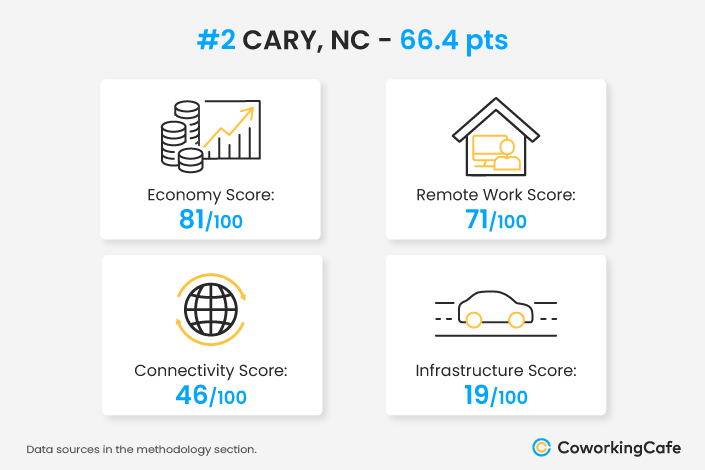
A significant 41% of Cary’s workforce is remote, which is the highest share among the cities analyzed. What’s more, this green, suburban-like North Carolina city boasted the second-lowest unemployment rate of only 1.6%. It’s also generally known for its affordable living, which is supported by the median yearly income in this area of almost $63,000.
Here, workers benefit from one of the best broadband coverages and can also easily travel in and out of the area due to the city’s proximity to two airports. As a result, this helps support an overall healthy work/life balance and accessibility for digital nomads and business travelers.
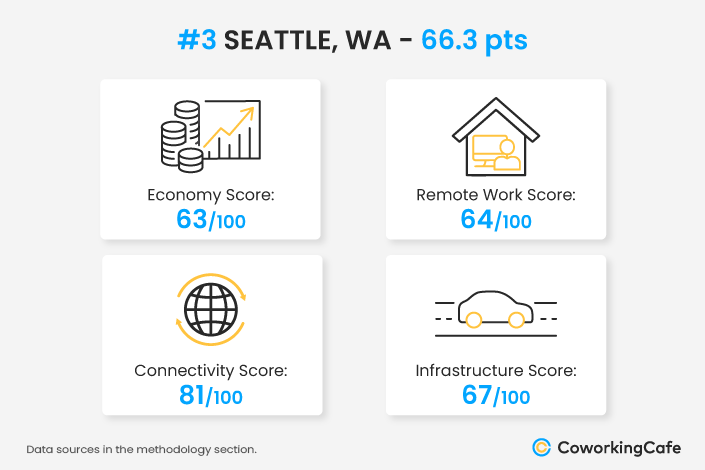
Coming in third in our ranking, Seattle reinforced its status as a thriving economic hub due to high earnings — including a median of more than $73,000 per year — paired with a low unemployment rate of only 3.3%. As a matter of fact, the Emerald City already has a large share of remote workers (36%), many of whom are likely to work at top employers in the area, such as Microsoft, Dropbox or Amazon.
Seattle also boasted the highest public Wi-Fi density, thereby ensuring excellent connectivity. At the same time, the city ranked 11th in average internet speed and 14th in walkability, further enhancing the convenience and efficiency of remote work. Moreover, the city’s proximity to five airports within 70 miles underscored its seamless accessibility for remote workers, digital nomads and leisure travelers alike.
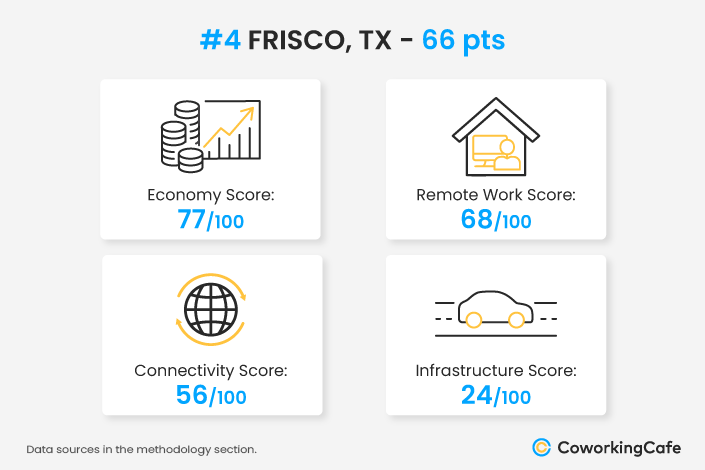
Frisco, TX, ranked as one of the most affordable cities for remote workers due to its great cost of living and high rankings across the board. Notably, nearly 40% of its workforce is remote — which highlights a strong remote work culture — and workers enjoy high earnings of more than $72,000 per year, which ranked it 11th nationally. Plus, with an unemployment rate of just 2.4%, Frisco also offers economic stability.
Not to be outdone, the city’s excellent broadband coverage and proximity to three major airports within 70 miles further enhance its appeal, making Frisco a prime location for remote workers seeking affordability and convenience.
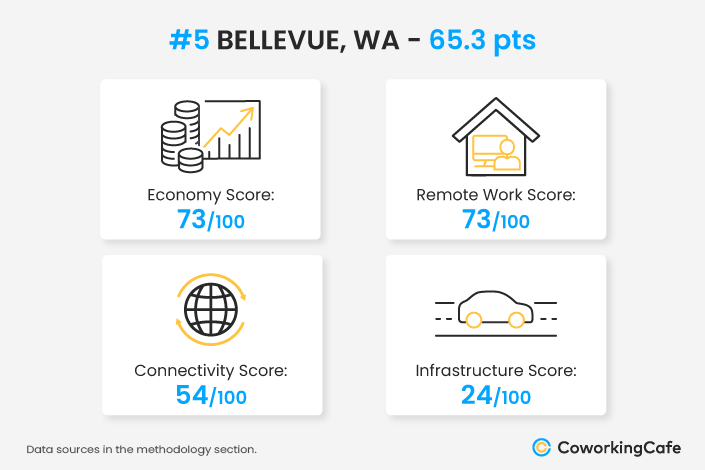
Known for its suburban vibe while also checking all of the big-city perks, Bellevue, WA, benefits from its proximity to Seattle and combines the best of both worlds. Namely, with plenty of large employers that allow remote work in the area, Bellevue came in third in the share of remote workers with almost 39% of its total workforce. Not only that, but professionals here earned the second-highest median income among all of the cities analyzed at more than $92,000 per year.
To top it all off, Bellevue also offered one of the best broadband coverages in the country after landing in sixth place in this category, which allows workers of any kind to get their jobs done without any hassle or interruptions.
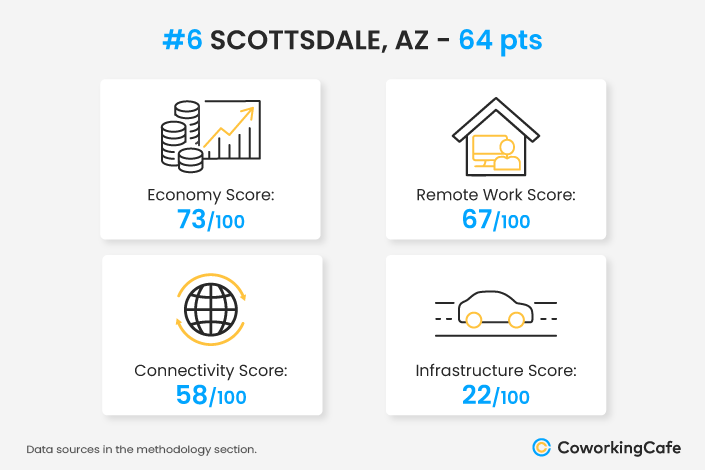 Recently named one of the hardest-working cities in the U.S., Scottsdale, AZ, proved that it can do remote right, too. And, in addition to more than one-third of its workforce being remote, this Arizona haven also claimed a low unemployment rate of only 2.6%, which goes to show that professionals in this area have a large job pool to choose from.
Recently named one of the hardest-working cities in the U.S., Scottsdale, AZ, proved that it can do remote right, too. And, in addition to more than one-third of its workforce being remote, this Arizona haven also claimed a low unemployment rate of only 2.6%, which goes to show that professionals in this area have a large job pool to choose from.
In particular, remote workers here have their choice of their ideal work environment as the city scored well in terms of coworking space density with more than 12 such spaces available per 100,000 residents. To that end, Scottsdale is 2024’s second coworking suburb in the nation, outdone only by Irvine, CA. This comes as a great benefit for remote workers who can now prioritize larger homes and more affordable areas, while also having easy access to a professional workspace right around the picket fence.
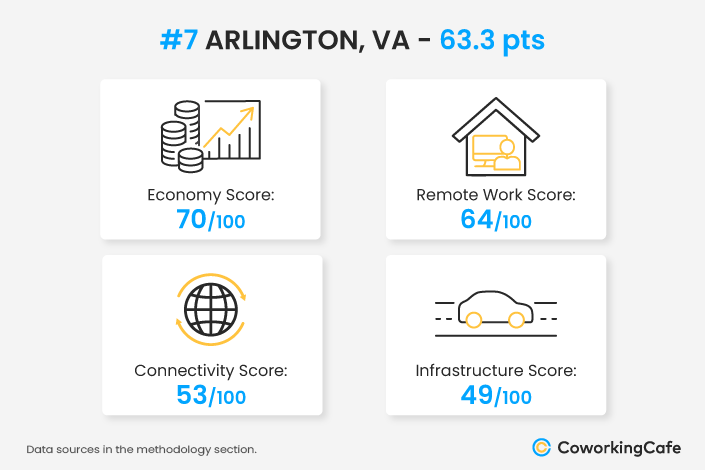
As the first (but not only) Virginia representative in this ranking, Arlington had a large share of remote workers among its professionals at almost 36% of the total workforce. It’s worth noting here that the city recently outshined all others in the nation as the hardest-working due to a low unemployment rate. What’s more, Arlington proves that remote work is not only accessible, but also that its earnings go a long way: The median yearly income in this area reached $87,000, which was the fourth-highest among the cities analyzed.
Moreover, Arlington makes it easy for professionals to get their work done due to reliable broadband coverage, while also ensuring that residents and nomads enjoy a healthy level of convenience and accessibility through a solid walkability score.
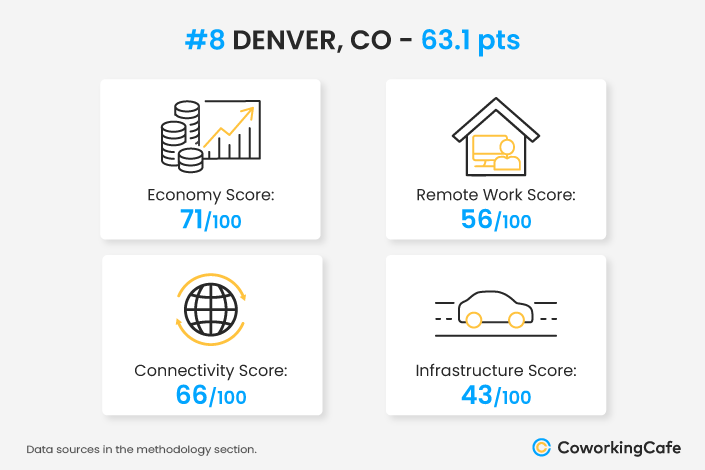
Despite not having top scores in individual categories, Denver managed to snatch eighth place in our ranking due to solid rankings across the board. For instance, in terms of supporting remote workers through fast and reliable internet connections, Denver came in 9th in broadband connection and 10th in public Wi-Fi density.
Coworking spaces are also highly accessible for remote workers, freelancers or digital nomads in the Denver area: The city boasted the 12th-highest coworking space density among the cities analyzed with more than 12 per 100,000 residents (and a total number of 89 spaces). And, when it comes to mixing business with leisure, the Mile High City also checked a high number of entertainment establishments, making it easy for residents to enjoy their free time.
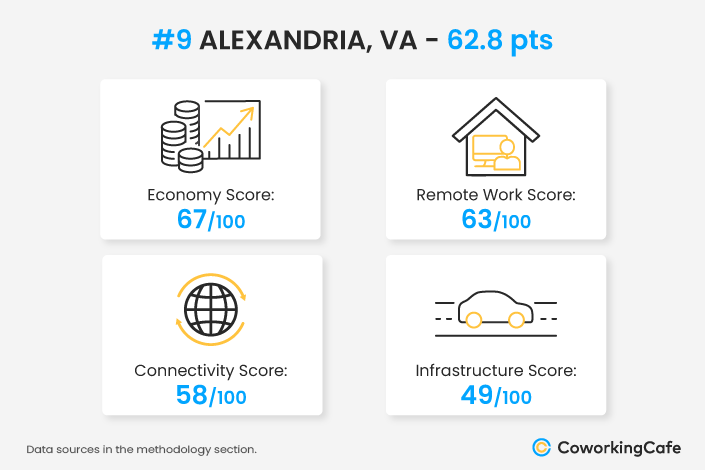
Remote workers in Alexandria, VA, have what it takes to secure an affordable living (given that the city scored high in median income at more than $76,000 per year) and also has great average internet speed (the seventh-highest among the cities analyzed). At the same time, the unemployment rate in this area was also one of the lowest in the nation at only 2%, making it easy for professionals of any kind to find enticing jobs and career opportunities.
Furthermore, for those who work remotely, but still need a professional space for their business needs, Alexandria had almost 13 coworking spaces available per 100,000 residents, which translated to the ninth-highest coworking density in our ranking. And, the high number of entertainment establishments around the city ensures that locals can not only work hard, but also enjoy their free time in a way that fits their needs and preferences.
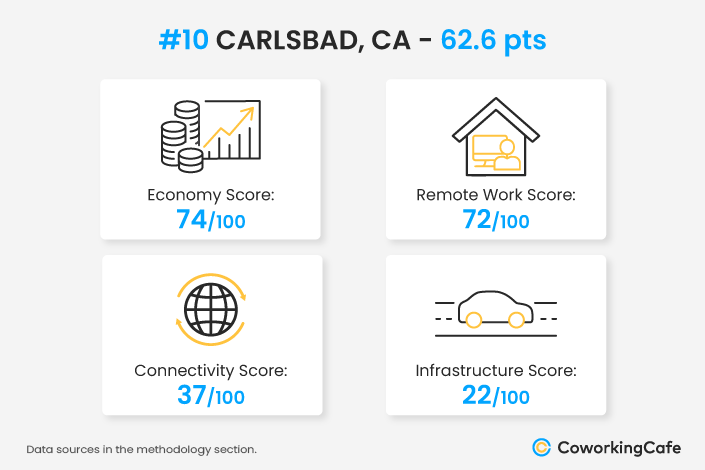
Rounding out the top 10 most affordable cities for remote workers was Carlsbad, CA, driven by its impressive coworking density of almost 15 spaces per 100,000 residents. Plus, coworking spaces here are more affordable than in other areas as Carlsbad came in 15th for coworking prices — the highest ranking of all of the cities in the top 10.
The city also boasted a high median income of nearly $82,000 per year, further enhancing its affordability. Meanwhile, with nearly 34% of its workforce operating remotely — coupled with its fourth-place ranking in broadband coverage — Carlsbad offers an attractive and reliable environment for remote professionals.
Methodology
CoworkingCafe focused on U.S. cities with at least 100,000 residents that had data for all metrics analyzed.
Data points were analyzed comparatively with the extreme values within the data pool determining the highest and lowest possible scores for each metric.
The total score was calculated using the following data points and weighting:
Economy Score – 45% of the final score
- Median income: Median earnings in the last 12 months (in 2022 inflation-adjusted dollars) for population aged 16 years and older with earnings. [U.S. Census Bureau – one-year estimates (2022 – city level)] – 20%
- Cost of living: Composite index for the cost of living. State-level data was used where city-level was not available. [Council for Community and Economic Research (Q1 2023 – city level)] – 30%
- Unemployment rate: Percentage of unemployed population. [U.S. Census Bureau – one-year estimates (2022 – city level)] – 20%
- Coworking prices: The coworking subscription prices applied to three different memberships in each city: dedicated desk, virtual office and open workspace [CoworkingCafe (2024 – city level)] – 30%
Remote Work Score – 30% of the final score
- Share of remote workers: Share of working population that doesn’t commute to work. [U.S. Census Bureau – one-year estimates (2022 – city level)] – 60%
- Coworking space density: Number of coworking spaces per 100,000 residents. [Commercial Edge (August 2023 – city level)] – 40%
Connectivity Score – 15% of the final score
- Average internet speed: Average Internet speed in Mbps. [BroadbandNow (city level)] – 50%
- Public Wi-Fi density: Ratio of free public Wi-Fi hotspots available per 100,000 residents. [Wi-Fi-FreeSpot (city level)] – 30%
- Broadband coverage: Ratio of broadband Internet coverage. [BroadbandNow (city level)] – 20%
Infrastructure Score – 10% of the final score
- Walkability: Walkability and pedestrian-friendliness score based on the availability and length of walking routes to nearby amenities, considering every city block, weighted by population density. [Walk Score (2021 – city level)] – 40%
- Density of entertainment establishments: Number of entertainment establishments (categorized by the U.S. Census Bureau as performing arts; spectator sports; museums, historical sites and similars; amusement parks and arcades; other amusement and recreation; drinking places; restaurants and other eating places) per 100,000 residents. [U.S. Census Bureau – Census Business Patterns (2021 – city level)] – 30%
- Airports within 70 miles: Number of airports at a maximum distance of 70 miles. [ClosestAirportTo.com (2023 – city level)] – 30%
Fair Use & Redistribution
We encourage and freely grant you permission to reuse, host or repost the images in this article. When doing so, we only ask that you kindly attribute the authors by linking to CoworkingCafe.com or this page so that your readers can learn more about this project, the research behind it and its methodology.







